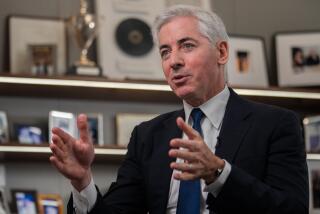Ducking Media Tends to Widen Credibility Gap
- Share via
Just when you’re inclined to believe that American business has entered the modern age of public accountability, something happens to show how far in the past some businessmen really live.
A recent example involved a request by one of our reporters to interview the top international officer of a multibillion-dollar manufacturer with operations all over the world. It took some time to fit a meeting into the executive’s travel schedule, but finally everything was set.
Then a hitch developed. It seems that this company’s chairman has decreed that he must approve any contact with the media.
It would be easy to understand, even if there weren’t any mistrust of the media, why companies would want only knowledgeable people giving interviews. But in a society that prides itself on freedom, it’s a little hard to understand how “knowledgeable” could mean one man in tens of thousands. More than likely, the real goal of this company is to stay away from the media as much as possible, period.
Fortunately, most corporate leaders have outgrown such notions of how best to serve their own interests. They’ve discovered that the best defense against a bad press and a critical public is a good and continuing offense.
Hence, Johnson & Johnson, presented in 1982 with the nightmare of someone poisoning one of its products, sought the media’s help to determine the extent of the problem and prevent panic. Union Carbide, for all its recent problems, at least had a reputation for frankness when it confronted the crisis of a deadly gas leak at a plant in Bhopal, India.
Coors a few years ago faced an inquiring Mike Wallace, preparing a “60 Minutes” TV segment on the company’s reputed anti-union activities. Instead of ducking, Coors opened its doors to Wallace, who prepared a well-balanced look at the firm’s employee relations.
Yet for all the evidence that such efforts build corporate credibility, some companies persist in their old ways, simply avoiding the press whenever possible. Sometimes it works and sometimes it doesn’t.
The public relations staff of a major bank, for instance, must have felt inclined to protect the bank’s chief executive from an inquiring reporter when it simply didn’t pass along a request for an interview. When a story appeared quoting critics of the bank, the CEO first blamed the reporter for not giving him his say. The outside world hasn’t heard what he said when he discovered the truth.
It’s an old mistake. Some years ago, the chief executive of a heavy-equipment company dressed down his public relations vice president when he discovered that the hapless aide had decided on his own that only the CEO could talk to the press.
“I won’t be here forever,” the CEO protested. “I want the public to know there are other capable people around here.”
More often, it’s the CEO himself who shuts off contact with reporters--and thus with much of the rest of the outside world. The result, often as not, is a lot of favorable news about the company that never makes its way into the media. Stonewalling seldom keeps the bad news out. In a crisis, there are too many angry people looking for media exposure.
It was a crisis that turned many top people in the oil business around. Faced with being made whipping boys for the energy problems of the 1970s, several major companies began seeking more media contact. Industry executives came calling on reporters and editorial writers, and Mobil began taking out ads.
Far more effective, Harold Haynes, then chairman of Standard Oil of California (the name is now Chevron), issued orders that there would no more “no comment” coming from any of his company’s offices. The “no comment” stopped and useful information found its way more frequently into stories about the company and the industry.
The media may or may not be doing a good job covering business, but they tend to do a lot better job when they can get to the right sources--and when they don’t get the response one corporate spokesman offered recently. “I have no comment,” he said, “and that’s off the record.”
More to Read
Inside the business of entertainment
The Wide Shot brings you news, analysis and insights on everything from streaming wars to production — and what it all means for the future.
You may occasionally receive promotional content from the Los Angeles Times.










